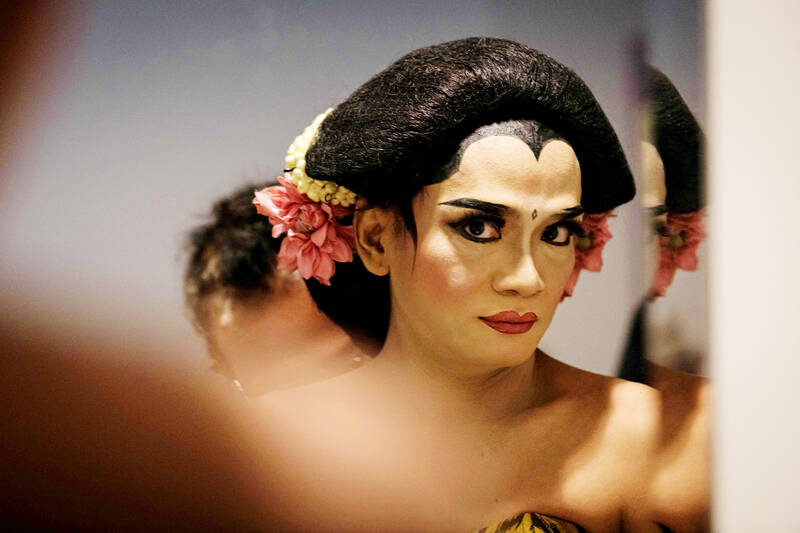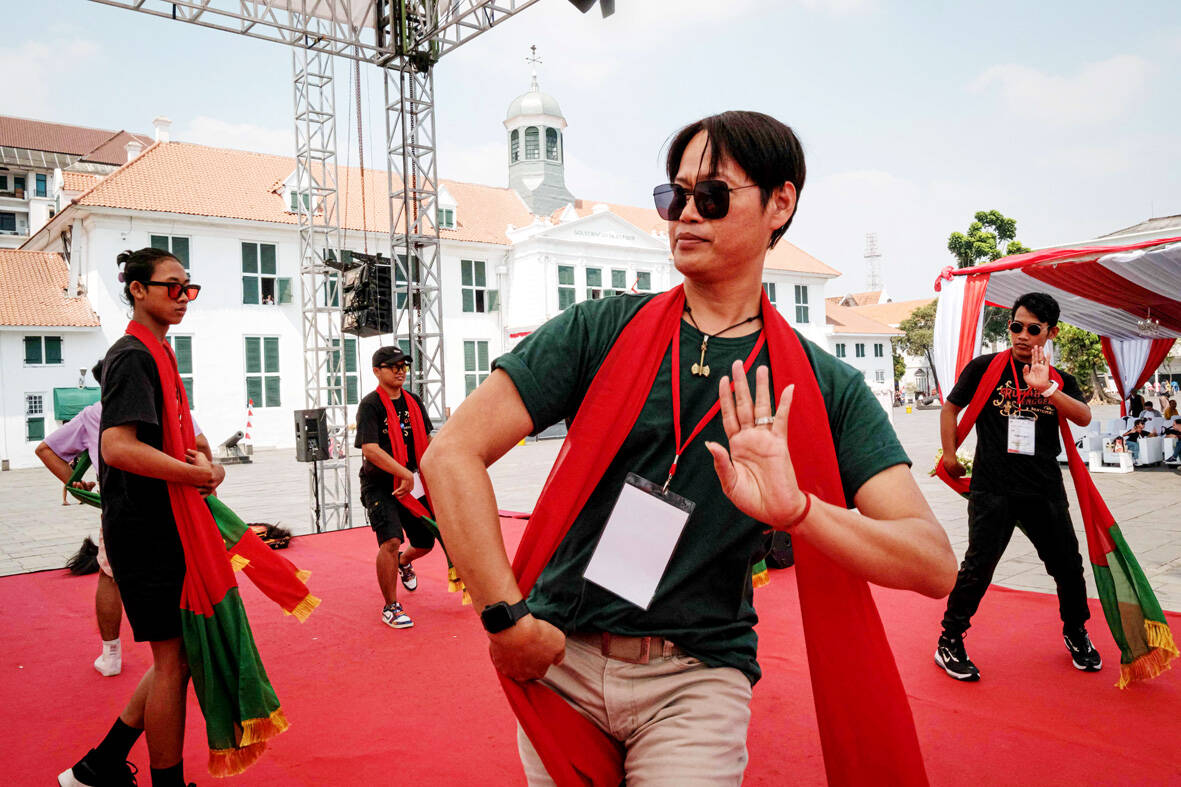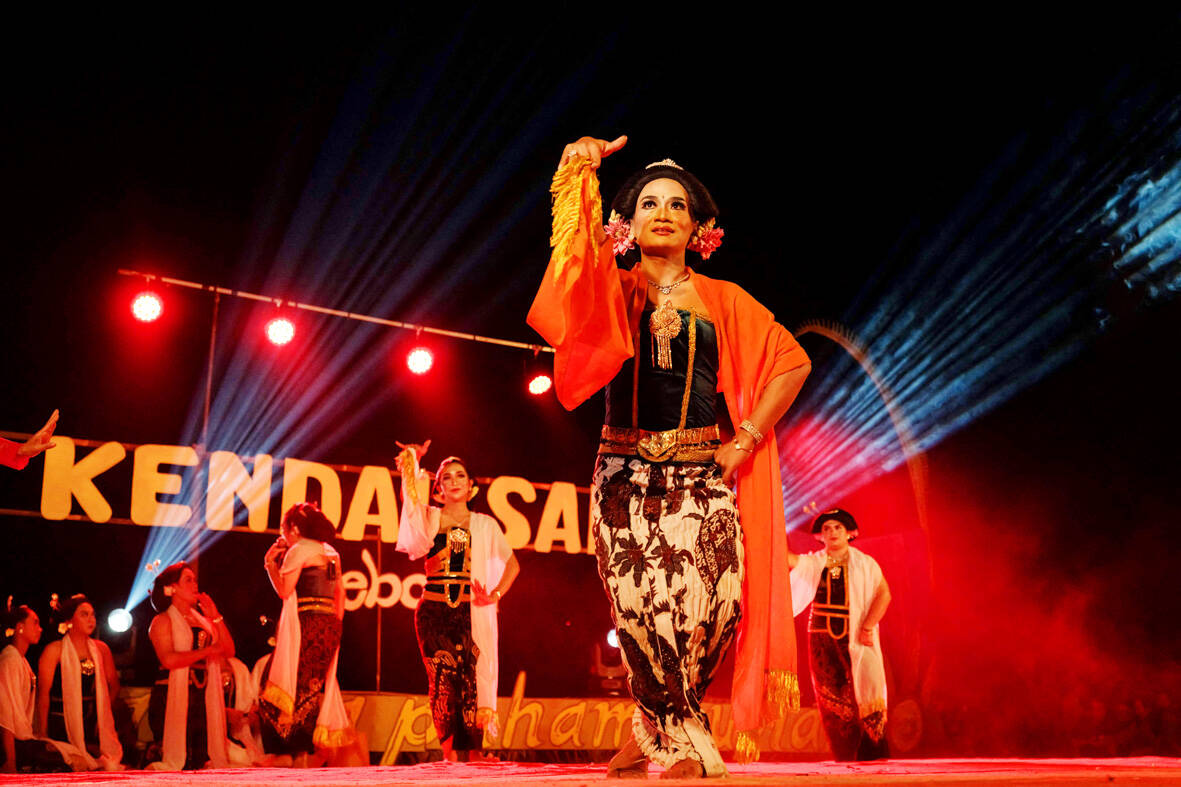Indonesian dancer Rianto moves gracefully in front of a crowd of thousands in the capital Jakarta, whipping his orange sash and in full make-up as he performs a centuries-old folk dance frowned upon by conservatives.
The Lengger Lanang dance tradition is rooted in 16th-century fertility and harvest rituals from Central Java province. It has since evolved into an art form that challenges rigid beliefs around masculinity in a deeply conservative and religious society.
Lengger Lanang is performed by men dressed as Javanese princesses, wearing tight, colourful batik dresses and ornaments woven into their fake hair bun updos.

Photo : AFP
But the tradition is close to disappearing in the Muslim-majority country, with fewer than 100 performers courageous enough to take part in shows.
“Lengger is still looked down on and negatively stigmatized,” 42-year-old dancer and choreographer Rianto said.
“People still see men dancing as going against the norm,” Rianto, who like many Indonesians has one name, added.

Photo : AFP
Backed by lively Javanese beats and melodies, the dancers sway their hips, flick their fingers and throw seductive glances at the audience in a Jakarta theatre.
The performers crack jokes in deep baritone voices, reminding their audience that, while they are wearing dresses, they are male.
“Lengger Lanang is where masculine and feminine meet inside one body and it is aimed to create peace within oneself,” said Rianto, who is married to a Japanese woman.

Photo : AFP
VANISHING ART
Lengger was once a highly revered folk art where performers were idolized and respected as performers able to embody both genders. But it is being challenged as prejudice grows against anything perceived as queer-related.
A 2018 movie about a Lengger Lanang dancer loosely based on Rianto’s life story received critical acclaim but was banned in several Indonesian cities after conservatives said it promoted homosexuality.
In the Central Javan town of Banyumas where Lengger Lanang was born, an art festival held in September is one of the few places where the art form can be celebrated openly. The dance was once considered a sacred tradition in the town.
“It was a post-harvest ritual to express gratitude to the goddess of fertility, later adapted into a form of entertainment, sometimes to welcome a grand guest,” Lynda Susana Ayu Fatmawati, cultural researcher at Jenderal Soedirman University, said.
Even today, in order to become a Lengger Lanang dancer, one must undergo several cleansing rituals such as fasting, bathing in springs, and meditation.
Before each performance, the dancers light incense, and lay out flower petals and coconuts as offerings to God.
’CHOSEN ONES’
Even though the dance is rooted in tradition, some conservative Muslims say men should not dress or act like women.
“In Islam, it’s clear that a man should not dress or act like a woman, and vice versa. It was condemned by the prophet,” Taefur Arofat, chairman of Banyumas Ulema Council, the town’s top Islamic body, said.
For Rianto and other dancers, that perception has made everyday life hard.
“Being a male dancer is very difficult. The stigma from the public is very negative because dancing is associated with femininity,” said Rianto.
Another dancer Torra Buana said he had to keep his dancing a secret.
“I once hid it from my family. Some people viewed it as a negative thing,” the 47-year-old said.
“But not all men can do this,” he said, referring to his dance form. “Only the chosen ones who have been blessed by God.”
PRESERVING LENGGER
Not all Indonesians have a problem with the tradition.
“It’s art and we need to prevent it from disappearing,” spectator Hendro Utomo said after the Jakarta show. Rianto has established Rumah Lengger, a center where young dancers can practice and learn the philosophy behind the art. One of the young prodigies is Ayi Nur Ringgo, who fell in love with the tradition after watching videos at university.
After taking it up, he was forced to confront negative comments from classmates.
“I have made peace with myself and my strength,” he said.
“I no longer care.” Under Rianto’s wing, he and fellow dancers are working to keep the tradition alive.
“I want to continue and regenerate this culture,” Rianto said. “Don’t let this fade away.”

The Democratic Progressive Party (DPP), Chinese Nationalist Party (KMT), and the country’s other political groups dare not offend religious groups, says Chen Lih-ming (陳立民), founder of the Taiwan Anti-Religion Alliance (台灣反宗教者聯盟). “It’s the same in other democracies, of course, but because political struggles in Taiwan are extraordinarily fierce, you’ll see candidates visiting several temples each day ahead of elections. That adds impetus to religion here,” says the retired college lecturer. In Japan’s most recent election, the Liberal Democratic Party lost many votes because of its ties to the Unification Church (“the Moonies”). Chen contrasts the progress made by anti-religion movements in

Taiwan doesn’t have a lot of railways, but its network has plenty of history. The government-owned entity that last year became the Taiwan Railway Corp (TRC) has been operating trains since 1891. During the 1895-1945 period of Japanese rule, the colonial government made huge investments in rail infrastructure. The northern port city of Keelung was connected to Kaohsiung in the south. New lines appeared in Pingtung, Yilan and the Hualien-Taitung region. Railway enthusiasts exploring Taiwan will find plenty to amuse themselves. Taipei will soon gain its second rail-themed museum. Elsewhere there’s a number of endearing branch lines and rolling-stock collections, some

Last week the State Department made several small changes to its Web information on Taiwan. First, it removed a statement saying that the US “does not support Taiwan independence.” The current statement now reads: “We oppose any unilateral changes to the status quo from either side. We expect cross-strait differences to be resolved by peaceful means, free from coercion, in a manner acceptable to the people on both sides of the Strait.” In 2022 the administration of Joe Biden also removed that verbiage, but after a month of pressure from the People’s Republic of China (PRC), reinstated it. The American

This was not supposed to be an election year. The local media is billing it as the “2025 great recall era” (2025大罷免時代) or the “2025 great recall wave” (2025大罷免潮), with many now just shortening it to “great recall.” As of this writing the number of campaigns that have submitted the requisite one percent of eligible voters signatures in legislative districts is 51 — 35 targeting Chinese Nationalist Party (KMT) caucus lawmakers and 16 targeting Democratic Progressive Party (DPP) lawmakers. The pan-green side has more as they started earlier. Many recall campaigns are billing themselves as “Winter Bluebirds” after the “Bluebird Action”